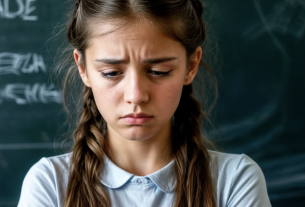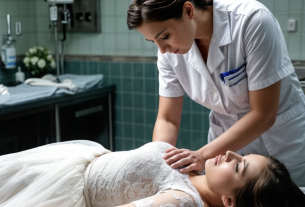— What’s that? — I stopped halfway to the station, listening carefully.
Crying came from the left — quiet but persistent. The February wind tickled my neck and flapped the edge of my coat. I turned toward the railway, where against the white snow, a dark abandoned switchman’s hut stood out.
A bundle lay right by the rails. An old, dirty blanket with a tiny hand peeking out.
— My God… — I picked it up from the ground.
A girl. About a year old, maybe a little less. Her lips were bluish, but she was breathing. She cried barely audibly — almost no strength left.
I opened my coat, pressed the baby to me, and ran back to the village — to the paramedic Marya Petrovna.
— Zina, where did you get her? — she gently took the child.
— Found her by the tracks. She was just lying in the snow.
— Abandoned, then. We need to notify the police.
— What police! — I pressed the girl again to my chest. — She’ll freeze on the way.
Marya Petrovna sighed and took baby formula from the cupboard.
— This will be enough for now. What do you plan to do next?
I looked at the tiny face. She stopped crying and buried her nose in my sweater.
— I’ll raise her. There’s no other way.
The neighbors whispered behind my back: “She lives alone, thirty-five years old, should have married long ago, and now she’s picking up other people’s children.” I pretended not to hear.
Some acquaintances helped with the paperwork.
I named her Alyona. This new life just beginning seemed so bright to me.
For the first months, I hardly slept. High fever, colic, teething pains. I rocked her in my arms, sang old lullabies I remembered from my grandmother.
— Ma! — she said at ten months, reaching out her hands to me.
I cried. So many years alone, and suddenly — a mother.
By two years old, she was already running around the house, chasing the cat Vasya. She was growing curious, poking her nose everywhere.
— Baba Galya, look how clever my girl is! — I boasted to the neighbor. — She knows all the letters in the book!
— Really? At three years old?
— Check it yourself!
Galya pointed to one letter after another — Alyonka named each one without mistakes. Then she told a story about the hen Ryaba.
At five, she went to kindergarten in the neighboring village. I took her there in passing cars. The teacher was amazed — she reads fluently, counts to one hundred.
— Where did such a clever girl come from?
— The whole village raised her, — I laughed.
She started school with long braids down to her waist. Every morning I braided them and matched ribbons to her dress. At the first parent meeting, the teacher came up to me:
— Zinaida Ivanovna, your daughter is extraordinarily gifted. Such children are rare.
My heart literally jumped with pride. My daughter. My Alyonushka.
The years flew by quickly. Alyonka grew into a real beauty — tall, slender, blue eyes like a clear summer sky. She won prizes at district Olympiads; teachers spoke warmly of her.
— Mom, I want to go to medical school, — she announced in tenth grade.
— That’s expensive, daughter. How will we manage the city, the dormitory?
— I’ll get a budget place! — her eyes shone. — You’ll see!
And she did. I spent the graduation in tears — of joy and fear. For the first time, she was going far away — to the regional center.
— Don’t cry, mommy, — she hugged me at the station. — I’ll come every weekend.
Of course, she lied. Studies took over completely. She came once a month, then less often. But called every day.
— Mom, we had difficult anatomy today! And I passed with honors!
— Well done, dear. Are you eating well?
— Yes, mom. Don’t worry.
In her third year, she fell in love — with Pasha, her classmate. She brought him home — a tall, serious guy. He shook my hand confidently, looked straight in my eyes.
— Good guy, — I approved. — Just don’t neglect your studies.
— Mom! — Alyonka got angry. — I’ll graduate with honors!
After university, she was offered to stay for residency. She chose pediatrics — decided to treat children.
— You once nursed me back to health, — she said on the phone. — Now I’ll save others.
She visited the village less often. Shifts, exams. I didn’t mind — I understood. Youth, city, a new life.
One evening she called unexpectedly. Her voice sounded strange:
— Mom, can I come tomorrow? I need to talk.
— Of course, dear. What happened?
— I’ll tell you when I arrive.
I barely slept all night. My heart sensed trouble.
Alyonka came pale, with sunken eyes. She sat at the table, poured herself tea, but her hands trembled so much she barely held the cup.
— Mom, some people came to me. They say… they are my biological parents.
The cup slipped from my hands and shattered on the floor.
— How did they find you?
— Through some connections, searched through mutual acquaintances… I don’t know exactly. The woman cried. She said she was young and foolish. Her parents forced her to give me up. Then she spent her whole life tormented by regret. She searched.
I was silent. I had waited and feared this moment for so many years.
— And what did you say to them?
— I said I’d think about it. Mom, I don’t know what to do! — Alyonka cried. — You are my real mom, the only one! But they suffered all these years too…
Holding her, I stroked her hair like I used to when she was a child.
— They suffered, you say? Then who left you in winter by the tracks? Who didn’t think if you would survive?
— She said she put me by the switchman’s hut because she knew he would come soon to check the tracks. Only he was sick that day…
— My God…
We sat hugging. Twilight was thickening outside the window. Vasya rubbed against my legs, meowing — asking for dinner.
— I want to meet them, — Alyonka said a few days later. — Just to talk. To know the truth.
My heart clenched, but I nodded:
— That’s right, daughter. You have the right to know.
The meeting was set in a city cafe. I went with her — sat in the next room, waiting.
She came out two hours later. Her eyes were red, but her gaze was calm.
— So, how was it?
— Ordinary people. She was seventeen. Her parents threatened to kick her out. Her father didn’t even know he had a child. She hid it. Then she married another man, had two more children. But she didn’t forget about me.
We walked through the spring city. The air was filled with the scent of blooming lilac.
— They want to be close. To introduce me to my brothers and sisters. The father… biological… is alone now. When he heard about me, he cried.
— And what did you decide?
Alyonka stopped, took my hands in hers:
— Mom, you will always be my mom. The one who raised me, loved me, believed in me. That will never change. But I want to understand them. Not instead of you — just to know myself better.
Tears welled up, but I smiled:
— I understand everything, darling. And I will be there for you.
She hugged me tightly:
— You know, she thanked you. For saving me, raising me to be who I am. She said I became better than I could have been with her — a scared girl without support.
— That’s not the point, Alyonushka. I just loved you. Every day. Every minute.
Now Alyonka has two families. She met her brothers — one became an engineer, the other a teacher. She keeps in touch with her biological mother: sometimes they call, sometimes meet. Forgiveness was not easy, but my daughter is stronger than anyone.
At Alyonka and Pasha’s wedding, we sat at the same table with that woman. Both of us cried watching the young couple’s first dance.
— Thank you, — she whispered to me. — For our daughter.
— Thank you, — I replied. — For trusting me with her fate.
Alyonka now works at the regional children’s hospital, treating little ones. When her own daughter was born, she named her Zina — after me.
— Mom, will you babysit? — laughs my daughter, handing me the granddaughter.
— Of course! I’ll tell stories, sing lullabies. Like I used to with you.
Little Zinochka grabs my finger with her tiny hands, smiling with her toothless mouth. Just like Alyonka did many years ago, when I first held her and realized: this is fate.
Love doesn’t choose whom to call its own. It just is — huge as the sky over the village, warm as the summer sun, eternal as a mother’s heart.



